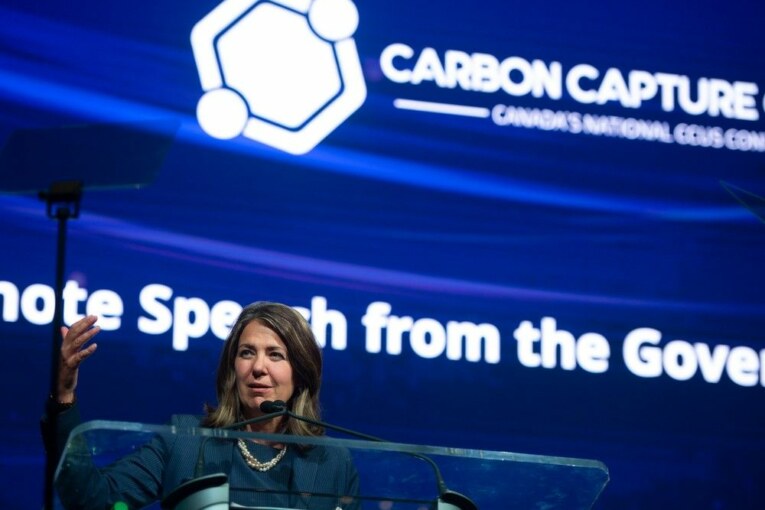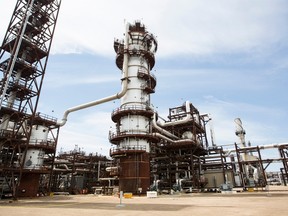
Premier Danielle Smith says the province should have an incentive package ready to unveil later this year for carbon capture projects — one that could have a price tag approaching $2 billion over a decade for the country’s largest oilsands producers.
The initiative, which could be structured as an investment tax credit, would be well worth the expense if it triggers new investment — the project by the Pathways Alliance group is expected to cost $16.5 billion to build — and helps decarbonize the province’s largest sector, Smith said in an interview.
The province is in discussions with the oilsands group and is also talking with the federal government on the carbon capture, utilization and storage (CCUS) front.
The premier previously said she expects to be able to announce the program’s details before the COP28 United Nations Climate Conference in Dubai, which runs the end of November until Dec. 12.
While exact terms of the initiative haven’t been finalized, Smith noted the province’s existing Alberta Petrochemicals Incentive Program (APIP) provides grants worth 12 per cent of a project’s eligible capital costs.
“We would like to have some kind of structure that we think is sustainable across the entire industry. And what we have landed on for the APIP program is 12 per cent, what we’ve landed on for our agri-food tax credit program is in that same range,” she said.
And how much would the incentive package be worth?
“We’re hoping that would be more done as a conventional tax credit, as opposed to a rebate program,” Smith added.
“If it is $16 billion (to build the CCUS project) and it’s 12 per cent … that’s $1.92 billion over potentially 10 years, which is perhaps $200 million, $192 million a year — of them being able to keep more of what they earn.
“Let’s be clear that it would be structured that way — that it would be just a reduction in their taxes and they’re going to be able to increase production … People need to be looking at this (as) how do we keep this industry thriving and growing over the next number of decades.”
Pathways Alliance, which is made up of six large oilsands producers — including Suncor Energy, Canadian Natural Resources and Cenovus Energy — has proposed building a massive CCUS network in the province.
It plans to construct a CO2 transportation line that would eventually connect more than 20 oilsands facilities to an underground storage hub near Cold Lake.
The Trudeau government has previously announced it will provide a federal investment tax credit for CCUS projects worth up to 50 per cent for capital spending on equipment to capture CO2. It’s also working on the terms of a federal contract for differences that would guarantee the long-term future price of carbon.
Both Ottawa and the Pathways group have been calling on the province to provide incentives to help propel the CCUS development forward.
Smith noted the oilsands sector will contribute $20 billion to $30 billion in combined royalty payments and corporate income taxes annually to provincial coffers, according to some projections.
“We need to make sure that we are the best barrel in the market … We do not want to have our industry having to gear down. We want our industry to be able to continue growing and it’s through that growth that we’ll continue to get the revenues,” the premier said.
“Allowing them to keep a little bit of that over a 25-year time horizon, as they build out this carbon capture utilization and storage pipeline, that seems like a small price to pay.”
-
 Varcoe: Oilsands giants warn Canada falling behind U.S. on carbon capture incentives
Varcoe: Oilsands giants warn Canada falling behind U.S. on carbon capture incentives -
 Canada pushes ahead on carbon capture projects, but still awaits green lights
Canada pushes ahead on carbon capture projects, but still awaits green lights -
 From January: Smith says Alberta is tired of being Ottawa’s ‘punching bag,’ but will consider carbon capture aid
From January: Smith says Alberta is tired of being Ottawa’s ‘punching bag,’ but will consider carbon capture aid
The idea will face opposition, however.
Some environmental groups have criticized the effectiveness of capturing and storing CO2 emissions underground. Others support the technology but oppose governments providing additional incentives.
“There are already enough proposed incentives out there to make oilsands CCUS projects go around,” said Jan Gorski, director of the Pembina Institute’s oil and gas program.
“We need regulations, like the oil and gas cap, to ensure these investments happen.”
A report released Tuesday by the International Energy Agency reiterated the “critical” nature of CCUS to helping the world reach net-zero emissions by 2050, as it can curb emissions in industries that have limited options to decarbonize.
Yet, there are challenges to deploying the technology, including the operating costs and the ability to develop such projects at scale.
More than 45 countries now have CCUS projects under development. By June, only about 20 commercial CCUS projects under development had reached the stage of making a final investment decision.
“For their part, governments should develop effective support packages to help with operating, as well as capital costs,” the report states.

Smith noted the federal and provincial governments previously provided incentives to promote the oilsands.
In 1996, the governments of Liberal Prime Minister Jean Chretien and Progressive Conservative Premier Ralph Klein struck a deal to help new oilsands projects take off. The province created a new uniform royalty rate, while Ottawa adopted favourable tax changes.
“I look at it along the same lines,” she said.
“If we were able to do that to allow them to pay off the capital cost of construction, we should be able to do that to allow them to pay off the capital cost associated with putting in the emissions-abatement technology.”
Federal Natural Resources Minister Jonathan Wilkinson said recently the two levels of government have been talking about CCUS at a joint working group. Ottawa is working to ensure the overall financial package from the two governments is “thoughtfully integrated,” he said in an interview.
“At the end of the day, we want to incent deployment, but we don’t want to overpay. At the end of the day, companies have to be invested in this, too.”
Officials with the Pathways Alliance declined Tuesday to comment on the state of discussions with governments.
Earlier this month, Pathways Alliance president Kendall Dilling called the premier’s comments of having its incentive package ready for the COP28 conference “fantastic” news.
“We’re encouraged at this point by the conversations with all those key parties,” he said.
Chris Varcoe is a Calgary Herald columnist.
You can read more of the news on source
